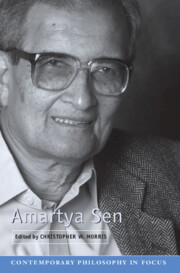Book contents
- Frontmatter
- Contents
- Contributors
- Preface
- Introduction
- 1 Preference, Choice, and Rationality
- 2 Ethics and Economics
- 3 Capability and Agency
- 4 Freedom in the Spirit of Sen
- 5 Social Choice Theory and the Informational Basis Approach
- 6 Sen on Sufficiency, Priority, and Equality
- 7 Famine, Poverty, and Property Rights
- 8 Development
- Selected Bibliography
- Index
- References
6 - Sen on Sufficiency, Priority, and Equality
Published online by Cambridge University Press: 05 June 2012
- Frontmatter
- Contents
- Contributors
- Preface
- Introduction
- 1 Preference, Choice, and Rationality
- 2 Ethics and Economics
- 3 Capability and Agency
- 4 Freedom in the Spirit of Sen
- 5 Social Choice Theory and the Informational Basis Approach
- 6 Sen on Sufficiency, Priority, and Equality
- 7 Famine, Poverty, and Property Rights
- 8 Development
- Selected Bibliography
- Index
- References
Summary
INTRODUCTION
Amartya Sen's contributions to moral philosophy have been enormous. He has made seminal contributions to the measurement of freedom, the measurement of equality, the measurement of poverty, the debate over the kind of equality that is relevant to justice, and the debate over the respective roles of liberty, efficiency, and equality in a theory of justice. I shall here focus on Sen's work on distribution-sensitive principles of justice, and more specifically on his work on (1) sufficientarian principles, which require promoting the adequacy of benefits (nonpoverty), (2) prioritarian principles, which require the promotion of individual benefits, but with some kind of priority for the worse off, and (3) egalitarian principles, which require the promotion of equality of benefits.
Sen's work in this area tends to focus on the development of a framework of investigation rather than an extended defense of any particular principles. My goal here will therefore be to present Sen's work, and related work by others, in an intuitively accessible manner that highlights its importance for existing philosophical debates on the topic. The presentation will mainly be a survey, with critical comments being only suggestive rather than fully defended.
BACKGROUND
Justice, as we shall understand it, is concerned with what benefits (net of specified burdens) we owe others. We shall leave open the nature of the relevant benefits (which might be income, wealth, well-being, or anything else).
- Type
- Chapter
- Information
- Amartya Sen , pp. 138 - 169Publisher: Cambridge University PressPrint publication year: 2009
References
- 3
- Cited by



